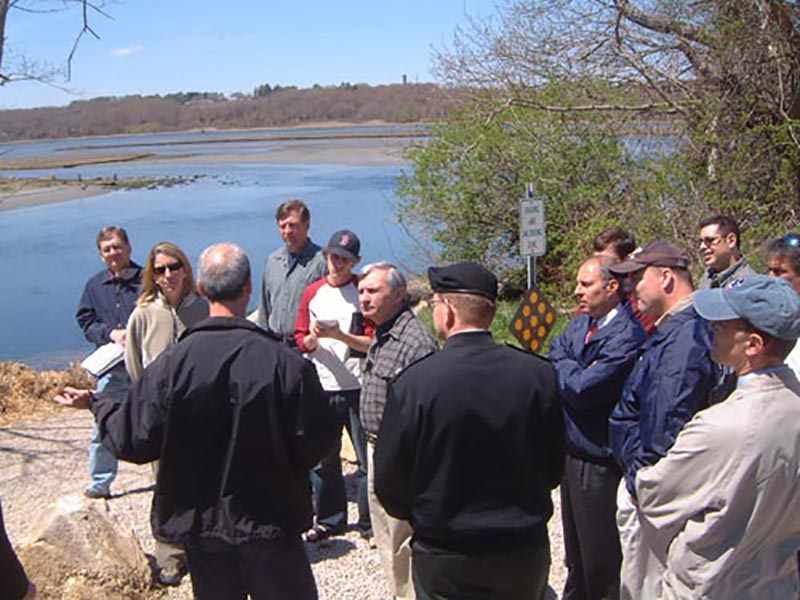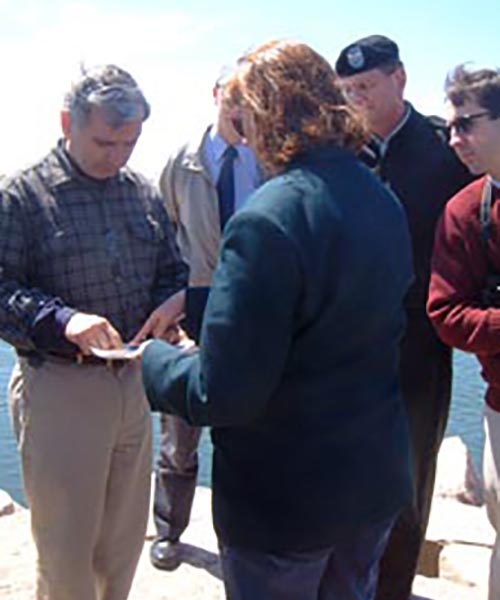
RI Coastal Resources Management Council
...to preserve, protect, develop, and restore coastal resources for all Rhode Islanders

...to preserve, protect, develop, and restore coastal resources for all Rhode Islanders
Reed Tours CRMC, Other Habitat Restoration Projects
May 9, 2005, WASHINGTON COUNTY — Sen. Jack Reed (D) toured Rhode Island's southern coast habitat restoration projects last week, stopping to view the work done to the Charlestown Breachway as part of the Ninigret Pond Restoration project, one of the three ponds included in the RI Coastal Resources Management Council's South Coast Habitat Restoration Project.
The CRMC is working with the U.S. Army Corps of Engineers on the project. Separately, the Corps is removing boulders in the breachway to improve the navigation channel and the waters approaching the channel. The Corps and CRMC are working to restore eelgrass habitat in Ninigret, Quonochontaug and Winnapaug Ponds in Charlestown and Westerly. The project will restore 57 acres of eelgrass habitat, as well as a fish passage to Cross Mills Pond in Charlestown which will create 20 acres of anadromous fish spawning habitat.
Construction is underway on Ninigret Pond, but work has ended for the season. The Corps estimates that about 70,000 cubic yards of material has been removed from the pond. Dredging will resume on October 15, and the work on Ninigret is slated to be completed in spring 2006. Eelgrass planting will follow until fall 2007, and the pond will be monitored for three years.
On his May 5 tour of South County's habitat restoration projects, Reed first stopped at Narrow River. While still in the planning stages, the Army Corps of Engineers plans to work with the CRMC on restoration measures and alternatives for the seven-mile-long river, which the Council has described as constricted and poorly flushed.
At the Trustom pond National Wildlife Refuge in South Kingstown, officials from U.S. Fish and Wildlife Service reviewed a three-year project to control non-native invasive phragmites, or common reed, that crowds out native plants. Trustom Pond Refuge, with more than 640 acres of wildlife habitat, is Rhode Island's only coastal pond free of shoreline development. USFWS also discussed a proposed project for expanding water control work into the adjacent Cards Pond as part of an overall restoration project in partnership with many private landowners.
Later in the afternoon, Reed visited the new headquarters building and Kettle Pond Visitor Center in Charlestown, still under construction. In addition to welcoming visitors to the Refuge Complex, the facility will serve as an environmental education center. The building design incorporates use of recycled materials and relies on geothermal heat pumps to help heat and cool the facility. The USFWS also plans to install solar panels to reduce energy costs. Officials from the U.S. Department of Agriculture's Natural Resources Conservation Service then took Reed on a kayak tour of the Pawcatuck Watershed Water Use Optimization Project at Wood River in Richmond. Federal funding will help continue the development of a model to assess existing water use needs in the 195,000-acre Pawcatuck Watershed and strategically plan for new uses. This is the final year of the four-year project.
Reed's last stop for the day was a tour of the 145-acre Hoxsie Farm in Hopkinton and its Hoxsie Forest Legacy program. The farm sits on the southern edge of the Arcadia Ponds Matrix forest, which consists of 18,000 acres of relatively uninterrupted forest in Rhode Island and Connecticut. Federal funds support the purchase of a conservation easement to ensure that the integrity of the forest and its canopy are preserved. Rhode Island State Forester (RI Department of Environmental Management) is overseeing the project.
"The hard work of these federal, state, local and private agencies in South County means not just the protection of rare natural habitats, but an opportunity to roll back the clock and restore what has been lost," Reed said. "Their work to restore and protect our natural resources is important to the quality of life of all Rhode Islanders. It not only supports our fishing industry but is vital to the state's ability to attract visitors and tourists to our shores."
Reed has secured more than $19 million for environmental restoration and preservation projects in Rhode Island.

Sen. Jack Reed (D) begins his daylong tour of South County habitat restoration projects at Narrow River on May 5. Here, Larry Oliver from the U.S. Army Corps of Engineers explains to the senator and others preliminary plans for improvements and habitat restoration.

Sen. Jack Reed studies a map of the dredging that has been done on Ninigret Pond, while CRMC Coastal Geologist Janet Freedman explains.